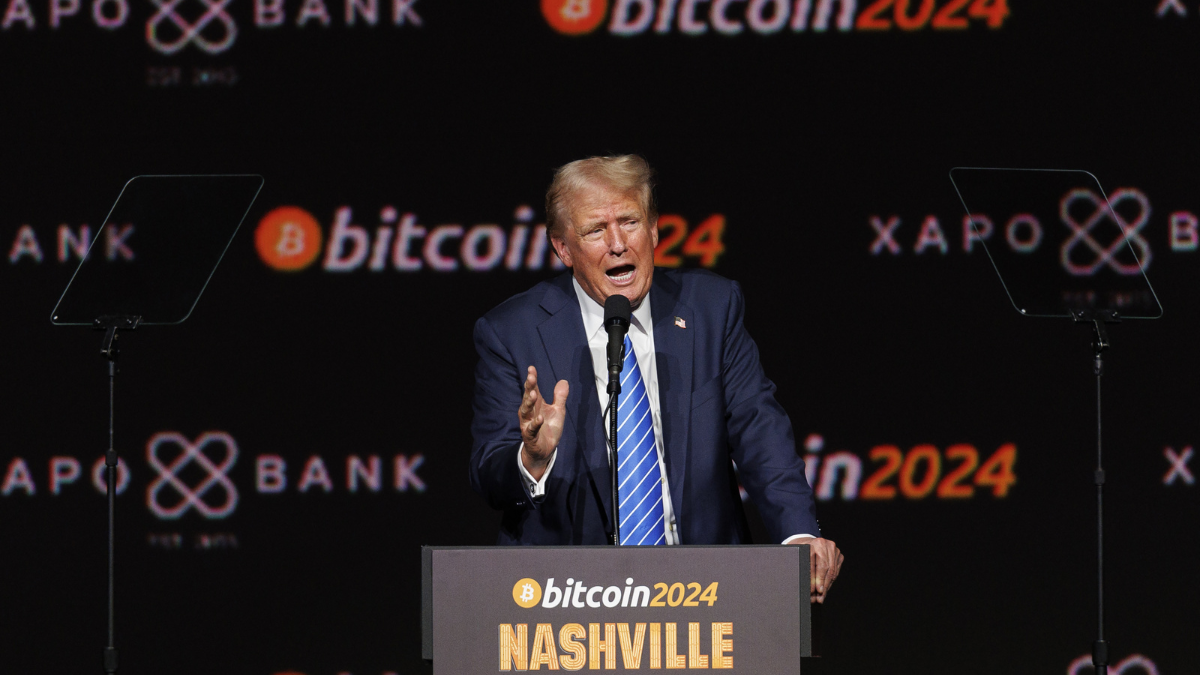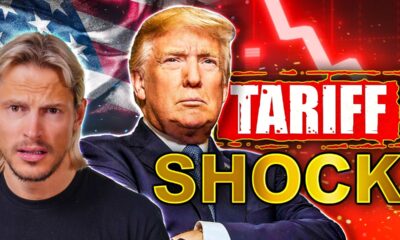Regulation
Trump impresses Bitcoin supporters, promises cryptocurrency-friendly regulation if re-elected

Donald Trump has announced his intention to fire the SEC chairman and appoint crypto-friendly regulators if he wins the 2024 presidency, in a bid to make the United States a “crypto capital.” At a Bitcoin conference in Nashville, Trump pledged to form a cryptocurrency advisory board, establish a framework for stablecoins, and support Bitcoin mining. His pro-crypto stance marks a significant shift, reflecting the industry’s growing political clout.
Sign up for your BizNews Insider newsletter to stay up to date on the most important news. The newsletter will arrive in your inbox at 5:30 a.m. on weekdays. Subscribe here.
Join us for BizNews’ first investment-focused conference on Thursday 12 September in Hermanus, featuring leading experts such as Frans Cronje, Piet Viljoen and more. Gain insights on South Africa’s electricity and gas wealth from new and familiar faces. Register here.
By Teresa Xie, Stephanie Lai and Alicia Diaz
Donald Trump has said he would fire the chairman of the Securities and Exchange Commission and pick cryptocurrency-friendly regulators if he returns to the White House in a bid to woo virtual currency enthusiasts and exploit the industry’s growing influence in the political arena.
“This afternoon I’m laying out my plan to ensure that the United States will be the crypto capital of the planet and the Bitcoin superpower of the world and we will get there,” Trump said at a Bitcoin conference in Nashville on Saturday.
The assembled crowd cheered loudly when Trump said he would fire SEC Chairman Gary Gensler, whose term does not end until 2026. If he wins the presidency, Trump would have significant influence over the top regulators of the booming industry.
“We will have regulations, but from now on, the rules will be written by people who love your industry, not by people who hate it,” Trump said.
He also pledged to form a presidential advisory council on the crypto industry, create a framework for stablecoins and call for reduced law enforcement.
Zachary Bradford, co-founder and CEO of Cleanspark, a bitcoin mining company, called Trump’s speech a “historic moment.” Trump repeatedly referenced miners and said that “America will become the undisputed bitcoin mining power in the world.”
Change of tone
The Nashville remarks are the latest demonstration of how the former president has embraced technology and sought to position himself as an advocate for crypto interests.
Trump expressed skepticism about cryptocurrencies during his time in office, saying he was “not a fan” and that their values were “based on hot air,” but in his 2024 presidential campaign he has changed course, increasingly highlighting Bitcoin and actively courting the cryptocurrency sector.
The shift reflects the industry’s growing prominence in American politics, as leaders seek to elect candidates whose policies support digital assets through ever-larger donations, in part through the Fairshake super political action committee, as well as Trump’s desire to reach new voters in his third presidential campaign.
Wyoming Republican Sen. Cynthia Lummis, who attended the Nashville conference, said she plans to draft a bill that would require the government to build a stockpile of up to 1 million bitcoins over five years. The bill would require the government to hold the cryptocurrency for 20 years, and during those two decades, it could only be used to pay down the national debt.
“The goal is to recognize that Bitcoin is a sustainable asset,” she said on the sidelines of the conference. “It’s digital gold and it’s a solid asset that can back the U.S. dollar and assure the world that the U.S. dollar remains worthy of being a global currency.”
Bitcoin, which had risen 2.9% earlier Saturday ahead of Trump’s speech, was little changed at nearly $68,000 by the end of the speech.
Political power
Crypto industry donors have paid more money According to OpenSecrets, the number of votes cast for the 2024 elections is higher than in all previous cycles combined.
Trump’s economic agenda, which promises to cut taxes and reduce government regulation, has found a receptive audience among Wall Street and business interests eager for an alternative to the policies of President Joe Biden and Vice President Kamala Harris, the likely Democratic nominee.
The cryptocurrency industry has been outraged by what it sees as overly heavy-handed regulation under Biden, following the collapse of the FTX exchange and other scandals. Trump has pledged to promote Bitcoin mining in the United States, protect the self-custody of cryptocurrencies and prevent the Federal Reserve from issuing a central bank digital currency which would compete with the industry.
“I think it’s pretty positive for the industry, pretty optimistic for the future,” said Paul Veradittakit, managing partner at Pantera Capital Management, who watched Trump’s speech live. He said he was “very excited that he wants America to be the capital of cryptocurrency.”
Trump’s appearance at the conference comes at a frenzied time in the 2024 campaign, marked by a failed assassination attempt on the Republican former president and Biden’s announcement Sunday that he would not seek reelection. The Democratic incumbent has endorsed Harris, 59, who is nearly two decades younger than Trump and threatens to undermine the gains he has made with young voters and people of color.
Trump has discussed cryptocurrency policy Tesla Inc. CEO Elon Musk also hosted cryptocurrency mining industry executives at his Mar-a-Lago resort and promised to commute the sentence of Ross Ulbricht, who is serving a life sentence after being convicted of running the Silk Road marketplace, where customers used virtual currencies to buy illegal drugs and hacking tools, according to a person familiar with the discussions.
A digital display highlighting Trump’s keynote speech at the Bitcoin 2024 conference on Saturday.
More significantly, the Trump campaign announced in May that it would begin accepting donations in digital assets. Since then, it has raised $4 million from a mix of digital tokens, according to a campaign aide, who detailed the amount on condition of anonymity.
Among Trump’s most prominent contributors are billionaire twins Cameron and Tyler Winklevoss, who run Winklevoss Capital Management and are big investors in Bitcoin. In his Nashville speech, Trump greeted the brothers by name and described them as “looking like male models with brains.”
The two men said they donated the equivalent of $1 million in cryptocurrency to a pro-Trump group, an amount that exceeded the maximum allowed. was refunded to the brothers.
Before the speech, Trump was scheduled to meet with crypto industry donors on Saturday at a fundraiser where seats went for up to $844,600Expected guests include the Republican candidate’s running mate, Sen. J.D. Vance of Ohio, who has also taken an interest in cryptocurrency and positioned himself as a supporter of the sector.
Read also:
© 2024 Bloomberg LP
Regulation
Crypto community gets involved in anti-government protests in Nigeria

Amid the #EndBadGovernanceInNigeria protests in Nigeria, a notable shift is occurring within the country’s cryptocurrency sector. As the general public demands sweeping governance reforms, crypto community leaders are seizing the opportunity to advocate for specific regulatory changes.
Rume Ophi, former secretary of the Blockchain Stakeholders Association of Nigeria (SiBAN), stressed the critical need to integrate crypto-focused demands into the broader agenda of the protests.
Ophi explained the dual benefit of such requirements, noting that proper regulation can spur substantial economic growth by attracting investors and creating job opportunities. Ophi noted, “Including calls for favorable crypto regulations is not just about the crypto community; it’s about leveraging these technologies to foster broader economic prosperity.”
Existing government efforts
In opposition to Ophi’s call for action, Chimezie Chuta, chair of the National Blockchain Policy Steering Committee, presents a different view. He pointed out The Nigerian government continued efforts to nurture the blockchain and cryptocurrency industries.
According to Chuta, the creation of a steering committee was essential to effectively address the needs of the crypto community.
Chuta also highlighted the creation of a subcommittee to harmonize regulations for virtual asset service providers (VASPs). With the aim of streamlining operations and providing clear regulatory direction, the initiative involves cooperation with major organizations including the Securities and Exchange Commission (SEC) and the Central Bank of Nigeria (CBN). “Our efforts should mitigate the need for protest as substantial progress is being made to address the needs of the crypto industry,” Chuta said.
A united call for support
The ongoing dialogue between the crypto community and government agencies reflects a complex landscape of negotiations and demands for progress.
While actors like Ophi are calling for more direct action and the inclusion of crypto demands in protest agendas, government figures like Chuta are advocating for recognition of the steps already taken.
As protests continue, the crypto community’s push for regulatory reform highlights a crucial aspect of Nigeria’s broader fight to improve governance and economic policies. Both sides agree that favorable regulations are critical to the successful adoption and implementation of blockchain technologies, signaling a potentially transformative era for Nigeria’s economic framework.
Read also : OKX Exchange Exits Nigerian Market Amid Regulatory Crackdown
Regulation
Cryptocurrency Regulations in Slovenia 2024

Slovenia, a small but highly developed European country with a population of 2.1 million, boasts a rich industrial history that has contributed greatly to its strong economy. As the most economically developed Slavic nation, Slovenia has grown steadily since adopting the euro in 2007. Its openness to innovation has been a key factor in its success in the industrial sector, making it a prime destination for cryptocurrency enthusiasts. Many believe that Slovenia is poised to become a powerful fintech hub in Europe. But does its current regulatory framework for cryptocurrencies support such aspirations?
Let’s explore Slovenia’s cryptocurrency regulations and see if they can propel the country to the forefront of the cryptocurrency landscape. My expectations are positive. What are yours? Before we answer, let’s dig a little deeper.
1. Cryptocurrency regulation in Slovenia: an overview
Slovenia is renowned for its innovation-friendly stance, providing a supportive environment for emerging technologies such as blockchain and cryptocurrencies. Under the Payment Services and Systems Act, cryptocurrencies are classified as virtual assets rather than financial or monetary instruments.
The regulation of the cryptocurrency sector in Slovenia is decentralized. Different authorities manage different aspects of the ecosystem. For example, the Bank of Slovenia and the Securities Market Agency oversee cryptocurrency transactions to ensure compliance with financial laws, including anti-money laundering (AML) and terrorist financing regulations. The Slovenian Act on the Prevention of Money Laundering and Terrorist Financing (ZPPDFT-2) incorporates the EU’s 5th Anti-Money Laundering Directive (5MLD) and aligns with the latest FATF recommendations. All virtual currency service providers must register with the Office of the Republic of Slovenia.
2. Cryptocurrency regulation in Slovenia: what’s new?
Several notable developments have taken place this year in the cryptocurrency sector in Slovenia:
July 25, 2024:Slovenia has issued a €30 million on-chain digital sovereign bond, the first of its kind in the EU, with a yield of 3.65%, maturing on 25 November 2024.
May 14, 2024:NiceHash has announced the first Slovenian Bitcoin-focused conference, NiceHashX, scheduled for November 8-9 in Maribor.
3. Explanation of the tax framework for cryptocurrencies in Slovenia
The Slovenian cryptocurrency tax framework provides clear guidelines for individuals and businesses. According to the Slovenian Financial Administration, the tax treatment depends on the status of the trader and the nature of the transaction.
- People:Income earned from cryptocurrencies through employment or ongoing business activities is subject to personal income tax. However, capital gains from transactions or market fluctuations are exempt from tax.
- Companies:Capital gains from cryptocurrency-related activities are subject to a 19% corporate tax. Value-added tax (VAT) generally applies at a rate of 22%, although cryptocurrency transactions that are considered as means of payment are exempt from VAT. Companies are not allowed to limit payment methods to cryptocurrencies alone. Tokens issued during ICOs must follow standard accounting rules and corporate tax law.
4. Cryptocurrency Mining in Slovenia: What You Need to Know
Cryptocurrency mining is not restricted in Slovenia, but income from mining is considered business income and is therefore taxable. This includes rewards from validating transactions and any additional income from mining operations. Both individuals and legal entities must comply with Slovenian tax regulations.
5. Timeline of the development of cryptocurrency regulation in Slovenia
Here is a timeline highlighting the evolution of cryptocurrency regulations in Slovenia:
- 2013:The Slovenian Financial Administration has issued guidelines stating that income from cryptocurrency transactions should be taxed.
- 2017:The Slovenian Financial Administration has provided more detailed guidelines on cryptocurrency taxation, depending on factors such as the status of the trader and the type of transaction.
- 2023:The EU adopted the Markets in Crypto-Assets (MiCA) Regulation, establishing a uniform regulatory framework for crypto-assets, their issuers and service providers across the EU.
Endnote
Slovenia’s approach to the cryptocurrency sector is commendable, reflecting its optimistic view of the future of cryptocurrencies. The country’s balanced regulatory framework supports cryptocurrency innovation while protecting users’ rights and preventing illegal activities. Recent developments demonstrate Slovenia’s commitment to continually improving its regulatory environment. Slovenia’s cryptocurrency regulatory framework sets a positive example for other nations navigating the evolving cryptocurrency landscape.
Read also : Hong Kong Cryptocurrency Regulations 2024
Regulation
A Blank Sheet for Cryptocurrencies: Kamala Harris’ Regulatory Opportunity

photo by Shubham Dhage on Unsplash
As the cryptocurrency landscape continues to evolve, the need for clear regulation has never been more pressing.
With Vice President Kamala Harris now leading the charge on digital asset regulation in the United States, this represents a unique opportunity to start fresh. This fresh start can foster innovation and protect consumers. It can also pave the way for widespread adoption across industries, including real estate agencies, healthcare providers, and online gaming platforms like these. online casinos ukAccording to experts at SafestCasinoSites, these platforms come with benefits such as bonus offers, a wide selection of games, and various payment methods. Ultimately, all this increase in adoption could propel the cryptocurrency market forward.
With this in mind, let’s look at the current state of cryptocurrency regulation in the United States, a complex and confusing landscape. Multiple agencies, including the Securities and Exchange Commission (SEC), the Commodity Futures Trading Commission (CFTC), and the Financial Crimes Enforcement Network (FinCEN), have overlapping jurisdictions, creating a fragmented regulatory environment. This lack of clarity has stifled innovation as companies are reluctant to invest in the United States, fearing regulatory repercussions. A coherent and clear regulatory framework is urgently needed to realize the full potential of cryptocurrencies in the United States.
While the US struggles to find its footing, other countries, such as Singapore and the UK, are actively looking into the cryptocurrency sector by adopting clear and supportive regulatory frameworks. This has led to a brain drain, with companies choosing to locate in more conducive environments.
Vice President Kamala Harris has a unique opportunity to change that narrative and start over. Regulation of cryptocurrencies. By taking a comprehensive and inclusive approach, it can help create a framework that balances consumer protection with innovation and growth. The time has come for clear and effective regulation of cryptocurrencies in the United States.
Effective regulation of digital assets is essential to foster a safe and innovative environment. The key principles guiding this regulation are clarity, innovation, global cooperation, consumer protection, and flexibility. Clear definitions and guidelines eliminate ambiguity while encouraging experimentation and development to ensure progress. Collaboration with international partners establishes consistent standards, preventing regulatory arbitrage. Strong safeguards protect consumers from fraud and market abuse, and adaptability allows for evolution in response to emerging trends and technologies, striking a balance between innovation and protection.
The benefits of effective cryptocurrency regulation are multiple and far-reaching. By establishing clear guidelines, governments can attract investors and mainstream users, driving growth and adoption. This can, in turn, position countries like the United States as global leaders in fintech and innovation. Strong safeguards will also increase consumer confidence in digital assets and related products, increasing economic activity.
A thriving crypto industry can contribute significantly to GDP and job creation, which has a positive impact on the overall economy. Furthermore, effective regulation has paved the way for the growth of many businesses such as tech startups, online casinos, and pharmaceutical companies, demonstrating that clear guidelines can open up new opportunities without stifling innovation. This is a great example of how regulation can allay fears of regressive policies, even if Kamala Harris does not repeal the current progressive approach. By adopting effective regulation, governments can create fertile ground for the crypto industry to thrive, thereby promoting progress and prosperity.
Regulation
South Korea Imposes New ‘Monitoring’ Fees on Cryptocurrency Exchanges

Big news! The latest regulatory changes in South Korea are expected to impact major cryptocurrency exchanges like Upbit and Bithumb. Under the updated regulations, these platforms will now have to pay monitoring fees, which could cause problems for some exchanges.
Overview of new fees
In the latest move to regulate cryptocurrencies, the Financial Services Commission announced on July 1 the revised “Enforcement Order of the Act on the Establishment of the Financial Services Commission, etc.” update “Regulations on the collection of contributions from financial institutions, etc.” According to local legislation newsThe regulations require virtual asset operators to pay supervisory fees for inspections conducted by the Financial Supervisory Service starting next year. The total fees for the four major exchanges are estimated at around 300 million won, or about $220,000.
Apportionment of costs
Upbit, which holds a dominant market share, is expected to bear more than 90% of the total fee, or about 272 million won ($199,592) based on its operating revenue. Bithumb will pay about 21.14 million won ($155,157), while Coinone and GOPAX will contribute about 6.03 million won ($4,422) and 830,000 won ($608), respectively. Korbit is excluded from this fee due to its lower operating revenue.
Impact on the industry
The supervision fee will function similarly to a quasi-tax for financial institutions subject to inspections by the Financial Supervisory Service. The new law requires any company with a turnover of 3 billion won or more to pay the fee.
In the past, fees for electronic financial companies and P2P investment firms were phased in over three years. However, the taxation of virtual asset operators has been accelerated, reflecting the rapid growth of the cryptocurrency market and increasing regulatory scrutiny.
Industry reactions
The rapid introduction of the fee was unexpected by some industry players, who had expected a delay. Financial Supervisory Service officials justified the decision by citing the creation of the body concerned and the costs already incurred.
While larger exchanges like Upbit and Bithumb can afford the cost, smaller exchanges like Coinone and GOPAX, which are currently operating at a loss, could face an additional financial burden. This is part of a broader trend of declining trading volumes for South Korean exchanges, which have seen a 30% drop since the new law went into effect.
-

 Regulation5 months ago
Regulation5 months agoNancy Pelosi Considers Supporting Republican Crypto Bill FIT21 – London Business News
-

 Regulation7 months ago
Regulation7 months agoRipple CTO and Cardano founder clash over XRP’s regulatory challenges ⋆ ZyCrypto
-

 Videos7 months ago
Videos7 months agoCryptocurrency News: Bitcoin, ETH ETF, AI Crypto Rally, AKT, TON & MORE!!
-

 Regulation6 months ago
Regulation6 months agoBitcoin’s future is ‘bleak’ and ripe for regulation, says lead developer
-

 News6 months ago
News6 months agoThe trader earned $46 million with PEPE after reaching a new ATH
-

 Blockchain6 months ago
Blockchain6 months agoSolana ranks the fastest blockchain in the world, surpassing Ethereum, Polygon ⋆ ZyCrypto
-

 Blockchain6 months ago
Blockchain6 months agoSolana Surpasses Ethereum and Polygon as the Fastest Blockchain ⋆ ZyCrypto
-

 Regulation6 months ago
Regulation6 months ago🔒 Crypto needs regulation to thrive: Tyler Cowen
-

 Videos7 months ago
Videos7 months agoKucoin safe?? Exchange REVIEW and beginner’s guide!!
-

 Videos6 months ago
Videos6 months agoWho Really CONTROLS THE MARKETS!! Her plans REVEALED!!
-

 Blockchain6 months ago
Blockchain6 months ago“Liquid vesting” is an oxymoronic feature of blockchain that allows early investors to sell without waiting
-

 Videos7 months ago
Videos7 months agoInstitutions purchasing MEMECOINS?! Everything you need to know!















